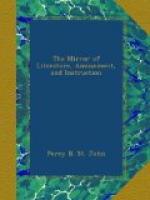Song-writing is the most difficult species of poetry; failure is not to be recovered—one slip ruins the whole attempt. A good song is a little piece of perfection, and perfection does not grow in every field. There must be felicity of idea, lightness of tone, exquisiteness or extreme naturalness and propriety of expression; and this within the compass of a few verses. And this is not all; the writer must betray a sustained tone of enthusiasm: the song should have neither beginning nor end,—it must seem a snatch from out of a continuous strain of melody—something that swells upon the ear, as if the previous parts had been unheard, and which dies away as if the air had carried its notes afar, and the sounds were wafted along to other lands. Men of genius are now and then born song-writers; such were Horace and Burns, such is Beranger. England has not had hers yet, and perhaps never may have. Englishmen are not nationally calculated to make song-writers; but individual genius makes light of running counter to a whole nation of habits, and there is no saying that we may not have our true lyricist yet. Song-writing is most likely to spring up among people greatly susceptible of the charms of music, and inventive of airs which, by some peculiar charm they possess, spread over all the country, sink deep in the memory, and come spontaneously on the thoughts in moments of sadness or joy, and, in short, become what are called national. National songs go with national airs, and spring up with circumstances. The English have few native airs, and as few native songs of any excellence. When an Englishman is in love, does he sing? In camp, what wretched braying goes by that name! at table, what have we of the generous, jovial sort? Generally speaking, our table songs—always excepting our glees—are pieces of bald sentiment, when they are English; but more generally, they are borrowed from the Scotch, the Irish, and other national song-writers. Gaiety, and that gaiety showing itself musically, is not English: when we are poetically given, it is in the sad piping strain of the forlorn, deserted, or hopeless lover. Gaiety is not English: we can be sentimental, tender, witty, pretty, pompous, and glorious in our songs; but we ever want the essential quality of gaiety—gaiety of heart—the dancing life of the spirit, that makes the voice hum, the fingers crack merrily, and the feet fidget restlessly on the ground.—Spectator Newspaper.
* * * * *
LORD BYRON’S EARLY POEMS.
[The following specimens are from the Seventh Volume of the elegant Edition of Lord Byron’s Life and Works, now in the course of publication, under the editorship of Mr. Moore:]
THE ADIEU.
Written under the impression that the Author would soon die.




